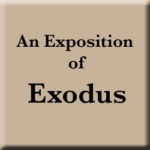
This exposition of Exodus 21:1-11 by Pastor Rod Harris was delivered at Trinity Baptist Church on Sunday morning, May 26, 2019.
Intro:
The first 20 chapters of Exodus are filled with intrigue, danger and excitement. God providentially safeguarded the infant Moses marked for destruction.
[sections collapse="always"][section title="Read More"]
Rather than drown in the Nile he ends up in the palace of Pharaoh as the adopted son of Pharaoh’s daughter. Moses grew to adulthood with all the advantages of Egypt’s ruling class. All the while God’s people suffer and cry out for deliverance. Moses, in an attempt to intercede on behalf of a mistreated Hebrew slave, murdered an Egyptian. A fugitive, Moses fled to the back side of the desert where he remained for 40 years. In a dramatic encounter at the burning bush Moses was set apart as Israel’s deliverer. What followed was an epic adventure filled with plagues, pronouncements and displays of divine power. Death reigned in Egypt and Pharaoh loosened his grip on the Hebrew people. They were not only allowed to leave but they plundered Egypt on the way out. In quick succession there was the parting of the Red Sea, water from a rock, manna and quail - God was providing for his people. Finally they reached Sinai, the Mountain of God. Summoned by the blast of the ram’s horn the people trembled as God thundered his commands. The first 20 chapters are exciting, the next few…not so much!
What follows, as Moses has entered the thick darkness were God was, is the application of God’s law. The fleshing out of those 10 words as Moses is given a quick course in biblical law. I say it’s not exciting, I suppose if you were a lawyer you might find it interesting…or, if you happen to be a sinner in need of grace. Our text this morning is found in Exodus chapter 21 beginning with verse 1.
Text: Exodus 21:1-11
Again, there is a false perception. That is that the Old Testament is all about law while the New Testament is about grace. No, law and grace run together throughout. We saw an example of that last time and we see it again in this morning’s text.
Do you find this text offensive? Do you have a hard time getting beyond the words themselves? Does it bother you to read, “When you buy a Hebrew slave…” and “When a man sells his daughter?” If it does, I certainly understand that and I’m going to get to it in just a moment but let me say upfront - this is not slavery as practiced in American history. This isn’t chattel slavery and it is not race-based and that’s why some translations use the term “servant” rather than “slave.” This text, in no way, can be used to justify or excuse slavery as practiced in our national history. More on that in a moment but first I want to set the context. God is applying the law to various life situations. This section 21:3-24:3 is referred to as, “The Book of the Covenant.” Look at verse 1 - “Now these are the rules that you shall set before them.” The word, “rules” means judgments or precedents that can be used for settling disputes among people. This is not a statutory code but rather a guide for judging cases. This is about how the moral law (given in the 10 words) applies in everyday life.
There are similarities between what we find in The Book of the Covenant and other ancient law codes. Some have made much of similar language in the codes of Hammurabi (1700 b.c.). That’s to be expected, most societies/cultures prohibit murder, stealing and other common crimes. But this is different due to legal protection for women and for the poor. You search in vain for such protections in other ancient codes. Of course the biggest difference is that this one is given by God! What I want you to note this morning is the note of the gospel sounded throughout.
Thesis: As our God begins to make application of his divine standards, we discover the wonder of the gospel concealed in the application of the law to everyday life.
There are three things I want us to note.
- Our God graciously provides for the oppressed. (21:1-4)
- Our God mercifully provides for the least and most vulnerable. (21:7-11)
- Our God inspires a response of profound love and enduring devotion. (21:5-6)
Conclusion:
What kind of master deserves such love?
- A good master
- A master who treated his servants as a friend
- A generous master who acted in his servant’s best interest
In other words a loving master.
One like the Psalmist describes: Psalm 40:6-8; Psalm 119:32
We are loved by the best Master of all. A Master who make himself our slave (Phil. 2:7; Mark 10:45). What would you do for a Master who saved your life at the cost of his own?
[/section][/sections]
